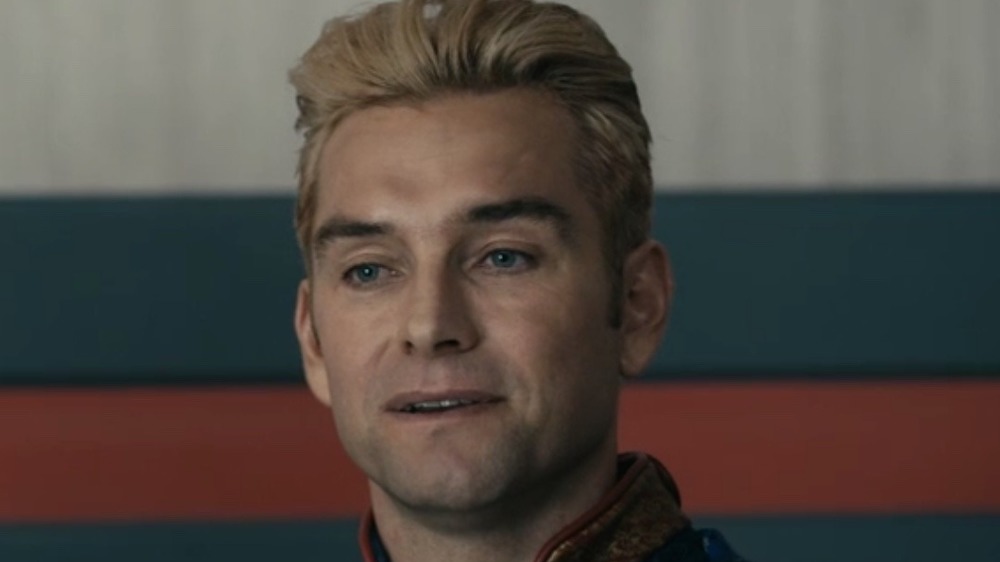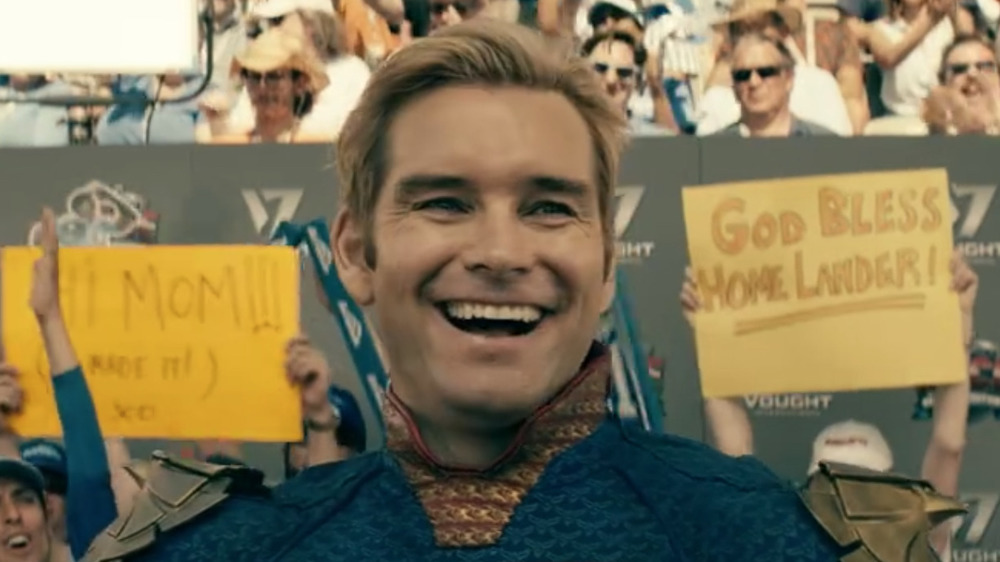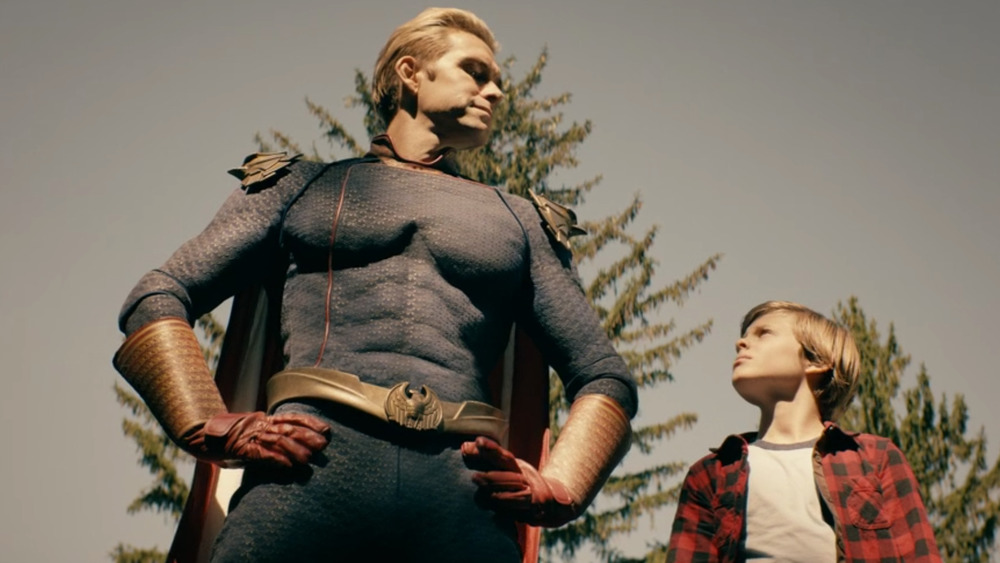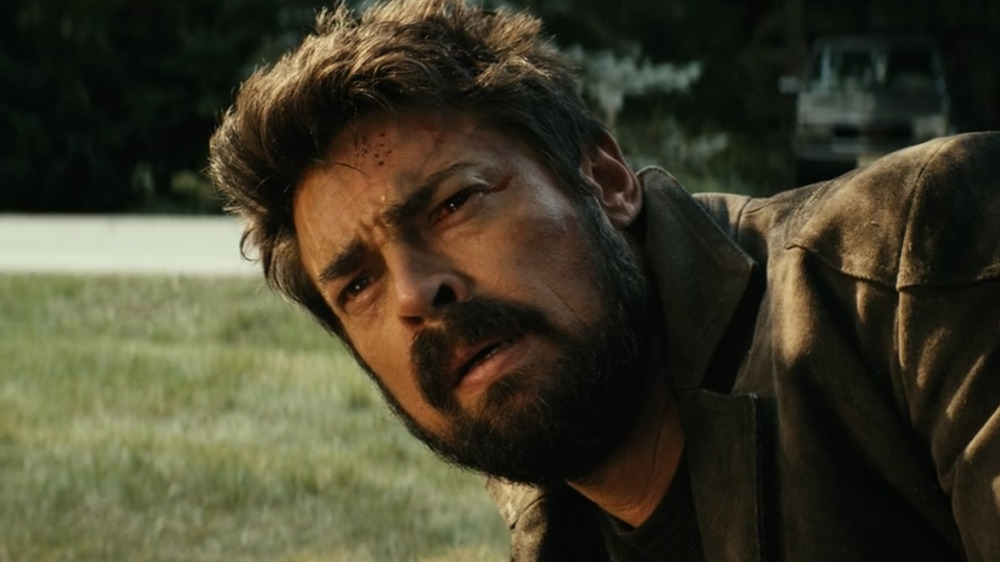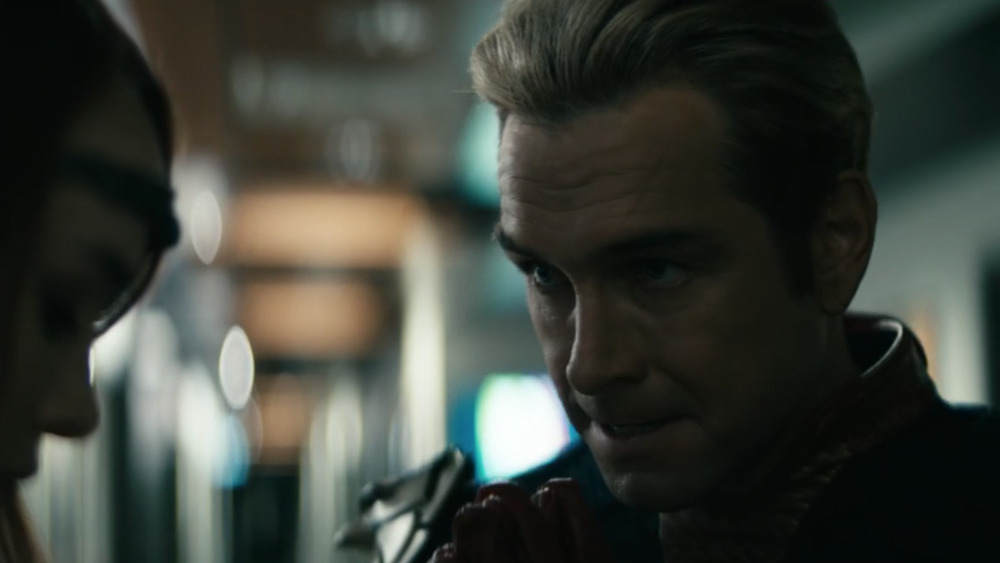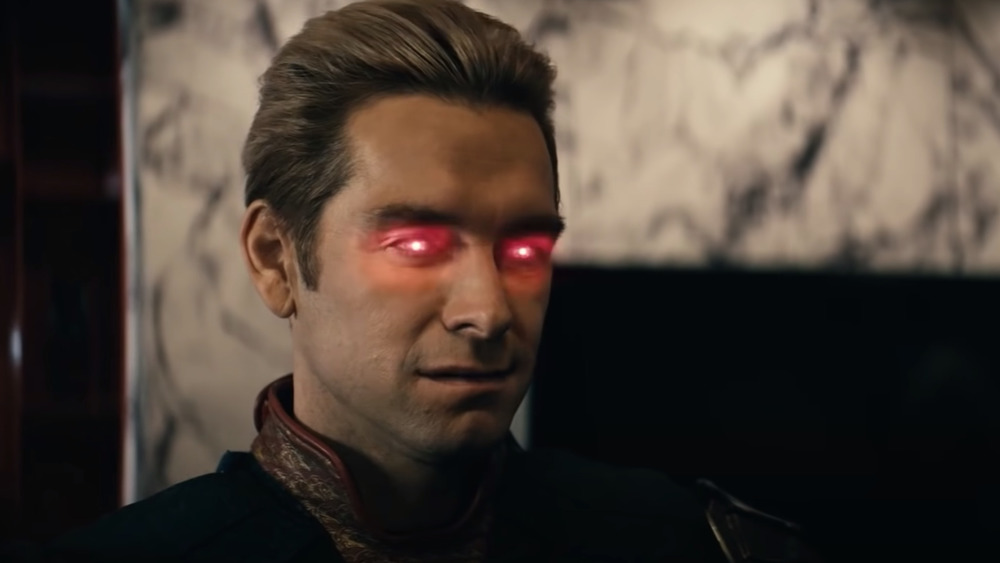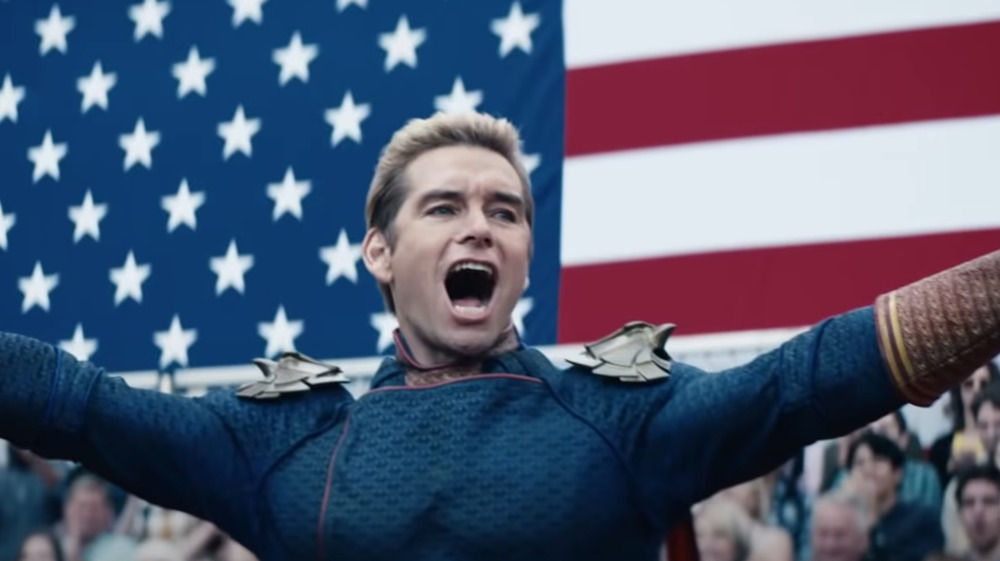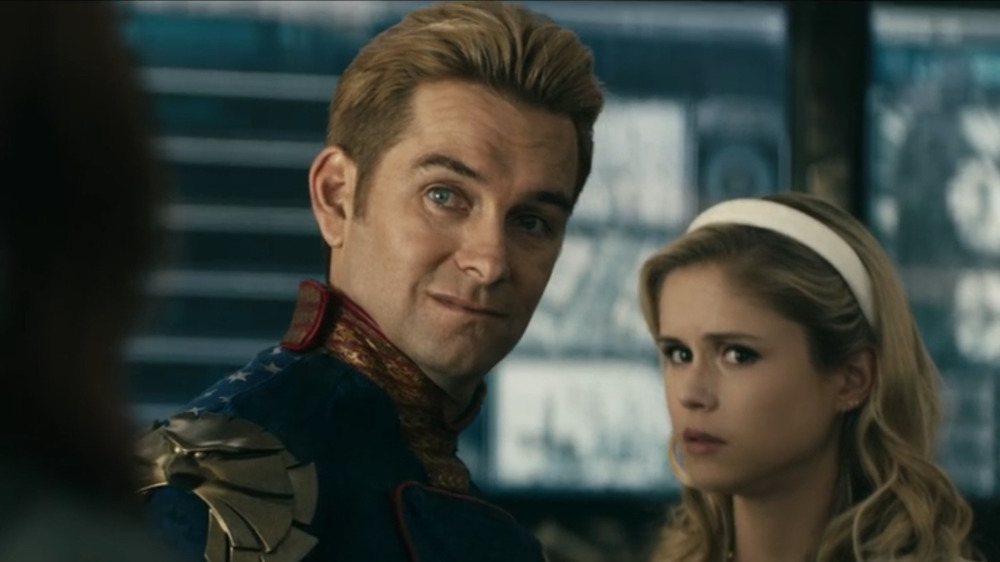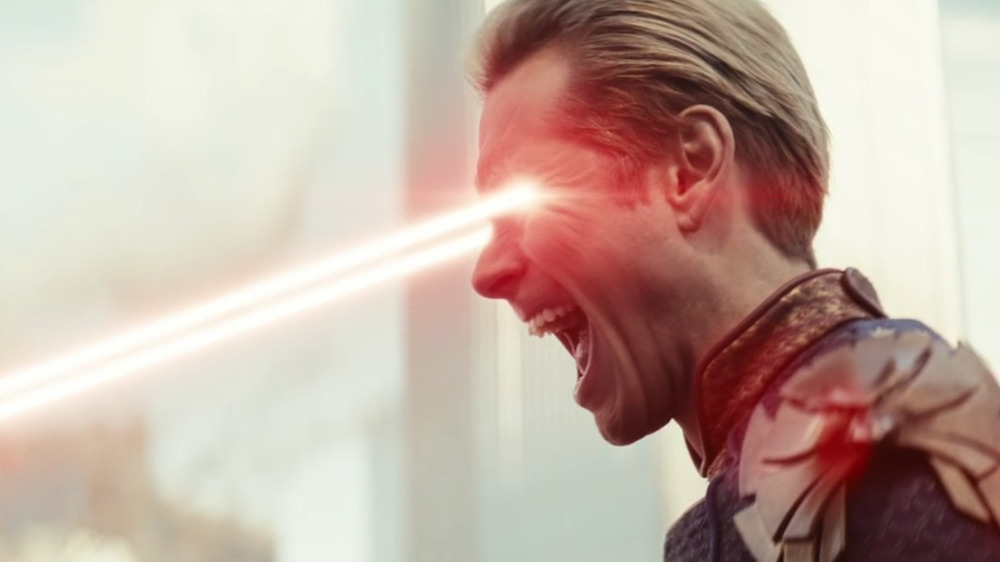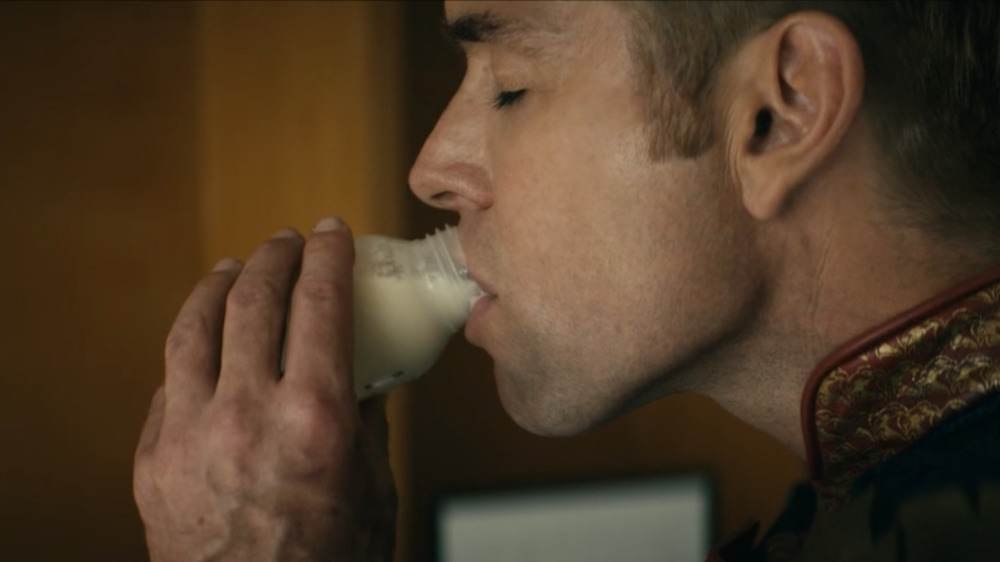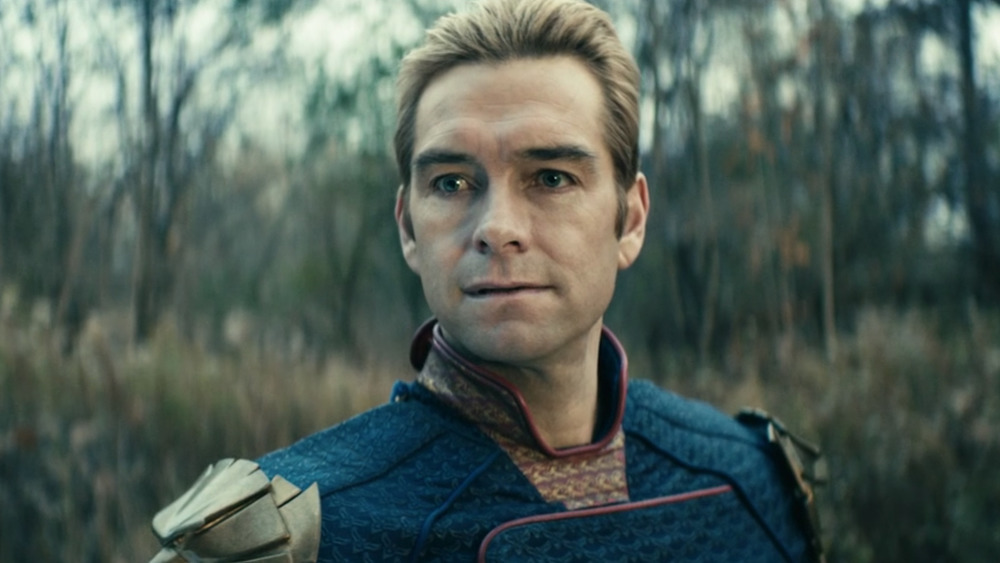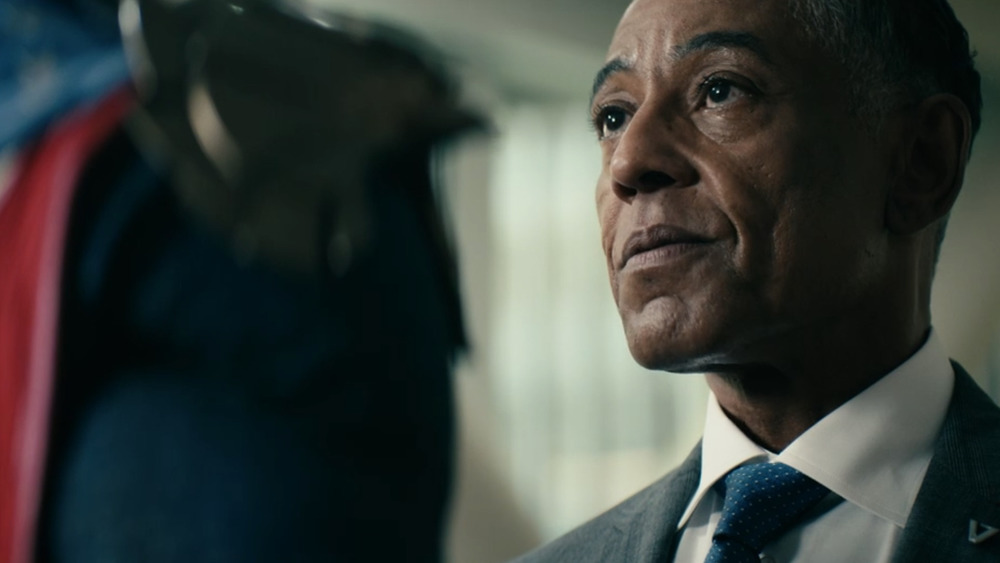Rules Homelander Has To Follow In The Boys
The Boys has proven that maniacal depravity knows no bounds. The show's core concept — superhumans (or "Supes," as The Boys calls them) with mental health issues — is a reality we were intrigued to slip into, and it fits like an itchy sweater. Most of the discomfort ties back to a psychopathic, bizarro Superman by the name of Homelander (played by Antony Starr). The superhero makes us laugh, cringe, and gasp all in the same scene.
Season 2 of The Boys amped up Homelander's cruelty and showed there are numerous ways for the man to inflict pain beyond simply slicing people in half with laser eyes. Believe it or not, the source material for The Boys displays an even greater level of psychopathy from "The Man In The Sky." The show dials back Homelander's comic book actions a few notches, but that hasn't stopped creators from pushing the limits. Once we watch Homelander perched on a rooftop beneath a full moon stroking his, ahem, "ego," these limits seem nonexistent.
Homelander's godlike powers might seem uncontrollable, but everyone answers to an authority. There may be superhumans flying around New York City in The Boys, but there are still laws that govern how Homelander operates in his metropolis. Here are the rules Homelander has to follow in The Boys.
Homelander has to smile for the camera
Homelander is the leader of The Seven, a group of superheroes who serve as the public face of conglomerate Vought International. The corporation has billions (if not trillions) to throw at their goal of world domination. Controlling consumer opinion is essential to churning out Vought's greenbacks. Homelander, who plays a significant part in crafting Vought's image, needs to be viewed as a beloved Golden Boy of American idealism. Americans are winners. And winners rarely frown.
Flashing those pearly whites for the camera is a requirement for Homelander — one that he's adept at, thanks to his upbringing.
A scowling superhero with glowing red eyes wouldn't evoke adoration; it would make those pathetic, normal humans fear Homelander. People hate what they fear, which, in turn, would mean they'd be less likely to spend money on Vought's superhero merchandise. To ensure his presence is comforting and sellable, Homelander needs to put on a friendly face. Any possibility of a camera being nearby means Homelander must flash his trademark smile to remind the public that he's the hero they deserve.
Homelander must always be suited up
You don't have to waste time suiting up when you're always suited up. One of the strictest rules for Homelander is that he can never remove his super suit. Homelander may remove only his pants. Even during erotic extracurricular activities, his torso must remain clad in American heroism. We can only imagine the noxious cloud of musk stewing beneath that padded fabric.
The suit constitutes Homelander's identity. Without its suspiciously fascist shoulder plates and American flag cape, Homelander wouldn't be Homelander. He needs the instant recognition and devotion it sparks in people; without these, he'd fade away into nothing. We shudder to think what would happen if this invincible manchild were ever torn from his favorite costume.
Homelander is required to play games with Butcher
As much as we hope Butcher (Karl Urban) doses up on Compound V and slaps Homelander around, he's but a simple mortal for now. A fight between the two would result in a mucky crater where Butcher's face used to be. You'd think Homelander would just dispose of the wily outlaw and be done with the whole ordeal, but Butcher gets to live on because a rule in The Boys makes him indispensable. Butcher is the ideal target for Homelander's experiments in psychological pain. Homelander needs to discover new ways to torture his victims, and Butcher is a perfect guinea pig.
Homelander is the pinnacle of destruction, but expectations are high for superheroes. He should always strive to be worse than he was yesterday — because we expect the best. Toying with Butcher gives Homelander opportunities to hone his savagery. Homelander could easily obliterate Butcher, but the star of the show can't die for quite a while, so Homelander instead dedicates considerable energy to playing cruel games with him.
Homelander needs to remind all the other Supes who's boss
Dozens of Supes dart around the world in The Boys, all with unique abilities, but the tippy-top tier of might is reserved for Homelander. Homelander doesn't rest on his laurels, however. He must chastise anyone who dares to threaten his throne. When glowing red eyes aren't enough to control the Supes beneath him, he's allowed to use any means necessary to maintain the status quo.
Homelander's preferred method involves barbed words laced in double meaning, accompanied by the intense gaze of the invincible. Reminding his brethren that he's better than them is a fun experience for him. While Homelander follows all the rules of The Boys religiously, he especially relishes this one. He delights in cultivating his craft, discovering countless ways to torment his peers beyond snuffing out the light in their eyes.
Homlander must use his laser eyes to make a point
All great speakers in history have ways of accentuating their statements, whether with a certain vocal inflection or a fist raised to the sky. Homelander is the face of evil for The Boys, so it's important for him to have his own exclamation point. The mesmerizing laser beams that shoot out of Homelander's eyes are his calling. It's an ability that he's required to use, and his favorite way to do so is during moments of intimidation.
That's not to say that Homelander can only summon the face-melters when he's angry; using them when he's calm can be especially creepy. As Madelyn Stillwell (Elisabeth Shue) knows all too well, these remarkable eyes can be deceiving. Frequency is key with this particular rule, and he's used his laser eyes in many creative ways. We always look forward to seeing these ruby light rays not just for the visual dazzle, but also for chuckling at Homelander being so pleased with himself.
Homelander has to remind America what it means to be a patriot
"Know your audience" is a maxim of the entertainment industry. The Seven are superheroes, but even more than that, they're entertainers, and their primary audience is the average American. The only thing this demographic loves more than happy endings is being told how awesome they are. Homelander knows this, and puts his knowledge to good use.
Homelander doesn't just claim to be an American; he defines what it means to be an American. This gives him control over how people perceive him. When you're the source of patriotism, you get to make the rules about what it means to be a patriot. Reminding America of this fact is a responsibility Homelander enthusiastically accepts. While the sun replenishes Superman, Homelander gets his energy from public adoration. To recharge his batteries, he need not do more than step up to a podium, extol the virtues of nationalism, and personally erect the pedestal he stands on.
Homelander is required to make everyone uncomfortable
There is power in silence — and Homelander is a superhuman with powers exceeding the average awkward soul. Homelander's lack of proper social skills labels stems from his exceptionalism. It's not that he enjoys being on the outside looking in; he just knows that others are trapped inside social norms, while the sky's the limit for him.
The Boys knows a man granted titanic power and raised in a laboratory is unlikely to be suave. The show embraces Homelander's social ineptitude, which he weaponizes and uses to unsettle others. Homelander's superpowers are the liquor in his cocktail of intimidation, but the discomfort he creates is the garnish.
We could just dismiss Homelander as a weirdo, but it almost seems like he's required to make everyone around him uncomfortable. The "power" of strangeness suits Homelander well, considering that he's the antithesis of everything we expect from our superheroes. Massacres muddle the valor, cruelty shrouds the kindness, and uneasiness replaces charming likability.
Homelander needs to show us the joys of mass murder
To engage with audiences, TV shows need a primary character with emotional range. In The Boys, we get to see Homelander alternate between his public and private persona, so we know what lies behind his smile. But to create a full spectrum, it's necessary for us to see Homelander experience true joy. Not that he deserves happiness; it's just a rule in The Boys. The best way to make Homelander's heart sing is to allow him to destroy as many fleshies as possible. Give him a crowd to kill, and the colossus of carnage is like a kid on Christmas.
Homelander shows us how much fun mass murder can be when you're indestructible. There's even a moment when we get a glimpse inside his mind and watch his laser eyes sweep and slice a sea of innocent people. His insatiable thirst for violence slurps up a fair amount of The Boys' gore slushie. The Boys uses his sadistic, sociopathic glee to complicate the concept of the superhero.
Homelander must guzzle some quality body fuel
To ensure he doesn't waste away, Homelander needs to indulge in the only thing that can satiate his primal thirst: a nice, tall glass of milk. Homelander corrupts the wholesomeness of the dairy beverage. It's not enough to ruin the lives of other characters on the show; he must also destroy the purity of milk and cookies for us as an audience.
But Homelander isn't a fan of cow's milk — that's 100% natural, nutritious human breastmilk he's guzzling. He must consume it compulsively in long, uncomfortably sensual feeding sessions. This might just seem like a gross detail, but it fits with Homelander's state of mind. Look at it this way: When you're enjoying a bowl of cereal in the morning, how much do you think about the milk's source? Exactly. Homelander thinks about human beings as much as we think about the cow that gave us the milk our Cheerios swim in.
Homelander has to show everyone who "The Man in the Sky" is
Floating among the clouds, Homelander knows all the specks below him are ripe for hero worship. Everyone wants to believe in something, and in The Boys' universe, that something is Homelander. Whenever citizens look to the heavens for comfort, Homelander can literally be that Big Guy in the Sky.
Both to feed his own ego and to gain the public's attention, Homelander must deliver grand displays. That's a tall order, particularly since Homelander has a busy schedule of films, commercials, and business meetings. The stubborn Supe skips out on a lot of these engagements simply because he isn't in the mood, but when it comes to public events, Homelander never misses a date. Making appearances is essential in the world of The Boys. The average American is easily distracted, and stardom fades. To avoid the fate of old forgotten gods, Homelander has to stay in the spotlight.
Homelander must respect the money
We're pretty sure Homelander is capable of love, even if it's hard to see through all the torture, narcissism, and milk. The Boys' writers constantly show us otherwise, but perhaps we need a small sliver of hope.
Homelander views pretty much everything with complete contempt. In fact, we can't think of anything he respects other than money. Vought International's profits don't simply fund Homelander's lifestyle; they're Homelander's entire reason for existing, and he knows it. He may get annoyed with the endless PR gauntlet, but he respects the process because it brings home the bacon.
Homelander is almost always the most powerful character in a scene, but a moment in season 2 showed us who's really boss. When Homelander demands more control from his corporate masters, Mr. Edgar (Giancarlo Esposito) puts him in his place, coolly reminding him that The Seven aren't the company's primary income stream and that he doesn't have to consult with the Supe about anything. Homelander is furious, but doesn't lose his temper because he knows that cash rules everything around him. He can't disrupt the capitalist machine. Sorry, Homeboy, them's the rules.
